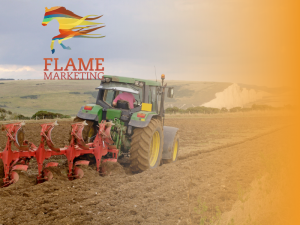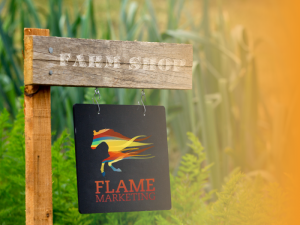

Farmers Weekly’s regional farm diversification event in Somerset brought together farmers and advisers to share tips and experiences of planning and running alternative ventures.
Andy Fussell, who runs a substantial, farming and contracting business based at Rode, near Frome in Somerset, believes common sense is usually the best approach to farm diversification. Alongside this he has developed Fussell Foods, producing bottled oilseed rape and associated products, a large haulage operation, a rapidly growing building supplies business, a feed blending plant and, most recently, a fishing lake. In a fluid economic background, traditional thinking has to be questioned, he says.
Fussell Foods, producing bottled oilseed rape and associated products, a large haulage operation, a rapidly growing building supplies business, a feed blending plant and, most recently, a fishing lake. In a fluid economic background, traditional thinking has to be questioned, he says.
“For example, we have rented in our two most recent trucks because of general uncertainty – it reduces the capital investment and at the end of four years, they go back. It is also important to understand and accept when you need expert help, whether that is with a planning issue or branding” he advises.
Mr Fussell’s biggest challenge or headache with his diversified businesses has been planning. As the enterprises expanded, he needed to move them from a cramped 1.2ha site, which is the original farmstead, to a 3.6ha greenfield site. It took seven years to achieve planning for this and his final approach was to invite each member of the 16-strong planning committee to visit the site individually. Planning for his most recent new venture, a fishing lake, took two years.
“At first I couldn’t even believe I needed planning permission to put in a lake,” he says.
Mr Fussell also outlined the highs and lows of getting products on to the shelves of the big retailers. A huge amount of work went into getting his oilseed rape oil products into Sainsbury’s, Morrisons and Tesco. However, after a year, he lost the Tesco listing overnight.
“That’s 1,400 stores just gone. It’s a very hard lesson to learn and a lot of business to make up. Our core business is on now the street at farmers markets and at shows. We also now have people pay £20 a time to come on the farm, learn about the product, see a cooking demo and a tasting. They see how the crop is grown and how we create the product from field to bottle. Farming needs to engage with the public – I can’t emphasise enough how much the general public want to know about what we do. We don’t hide anything.”
the farm, learn about the product, see a cooking demo and a tasting. They see how the crop is grown and how we create the product from field to bottle. Farming needs to engage with the public – I can’t emphasise enough how much the general public want to know about what we do. We don’t hide anything.”
With so many enterprises of different types, Mr Fussell has had to learn to delegate – something which he admits did not come easily. Having appointed trusted managers for each of the diversified businesses, he is now a firm believer in allowing them to run their areas, meeting with them regularly to discuss their management reports. However, keen to see the physical results of the farming enterprise, he still does all the combining.
“I can’t let go of that one,” he says.
The Farmers Weekly/Carter Jonas farm diversification survey results showed that after funding, planning and the likely cost of securing permission came second and third respectively among the main challenges experienced by those trying to set up new non-farming ventures.
Carter Jonas surveyor Nicola Palfrey gave her planning top tips:

Thurloxton Fruit Growers is a Somerset pick-your-own-fruit business, which has been expanding year on year. More than 10 years ago, the current owner approached the local authority to discuss expansion proposals for their retail space and was told that there was enough vacant shop space in Taunton or Bridgwater.
Following significant changes to planning policy over the past few years, a full planning application for a new additional building, prepared and submitted by Carter Jonas, has recently been approved and will allow further expansion of the business.
 Raising and marketing free-range bronze turkeys is a growing venture for Will and Kate Martin of Treway Farm near Truro, Cornwall. They started this almost as a hobby, then in 2015 they got serious, taking delivery of 250 day-old turkeys. Numbers have grown each year since and they are rearing 850 birds this year and hoping to do 1,000 next year.
Raising and marketing free-range bronze turkeys is a growing venture for Will and Kate Martin of Treway Farm near Truro, Cornwall. They started this almost as a hobby, then in 2015 they got serious, taking delivery of 250 day-old turkeys. Numbers have grown each year since and they are rearing 850 birds this year and hoping to do 1,000 next year.
“We’ve invested every year and, in 2016, we got a 50% grant through Leader funding for our new cold store, which cost £12,000 in total. Now we wish we had made it bigger,” says Will.
With the birds arriving in June, the venture fits neatly with their suckler beef enterprise, using the shed that is needed after Christmas for the beef cattle. All of their turkeys are sold direct to the consumer and they have achieved Golden Turkey producer status, of which there are only 40 nationwide. The birds are sold oven-ready and delivered across Cornwall and South Devon. However, most customers like to collect their bird at the seasonal pop-up farm shop that Kate and Will open.
“Because we sell direct, there’s a huge amount of admin, but we get all the profit,” says Kate.
Between 500 and 600 people visit the farm within the few days before Christmas, offering a chance to tempt them with associated festive foods. Marketing includes attending many shows, for which they have bought a catering oven, something the Martins wish they had done sooner.
“You can have the best product in the world, but if nobody know about it, you’re not going to sell it,” says Kate, who is also the driver of the hugely important social media side of their marketing.
“We’ve spent a lot on labelling and branding. Social media takes time, but it’s quick and it’s free. We use Instagram, Facebook and Twitter. We [farmers] can forget how magic our farms are. People buy from people – they are buying into you and your family, so sell them that story. Do as much as you can to embrace every PR opportunity.”
buying into you and your family, so sell them that story. Do as much as you can to embrace every PR opportunity.”
Kate advises “shameless” use of children in promoting farm produce. “Posts with kids in them so do so much better,” she says.
She also advocates entering awards. “The cost is small but a gold award can boost your brand.”
The Martins have also benefited from joining producer groups.
“The more you put in, the more you get out,” says Kate. ”And you learn so much for others – they were once at the stage you’re at now.”
Apart from the sleep-deprived hectic weeks in the run-up to Christmas, one of their main challenges is getting good seasonal staff, and as they expand, so this challenge grows. Aside from upping the turkey numbers again next year, the next step for Will and Kate is to market their bull-pen holiday cottage, which is in conversion and almost complete. They also want to relaunch their boxed beef scheme with stronger branding and marketing. As part of this, they plan to join the Pasture for Life brand, which guarantees that members’ meat is produced from animals fed exclusively on pasture.
Budgeting for a new non-farming enterprise in an unfamiliar market demands good research. The first step is to assess the strengths, weaknesses, opportunities and threats for the project, says Steph Emmerson of the Farm Consultancy Group.
“When building a budget, it’s important to carefully consider the likely timeframe in which a project might progress – not forgetting that planning permission, grant funding and building work can often take far longer than initially planned or hoped for.”
Steph suggests building in a contingency of 10% for the likely additional costs of the project.
Her further advice includes:
We would also recommend seeking support from marketing advisors, you can Check out our farm marketing strategy guide here, or you can book a consultation with us here. You may also benefit from attending the Farm Business Innovation show, you can get free tickets here.
Article taken from Farmer’s weekly